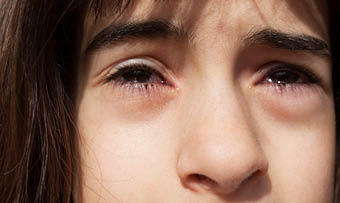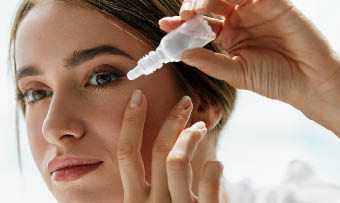- A-
- A+
What is allergic conjunctivitis?

Allergic conjunctivitis is provoked by allergen, intern allergen (mites, mildew we face every day at home or workplace) and environmental allergens (pollen, polluting substance, seeds, transported by wind).
Contact lenses cleaner can be an aggravating factor sometimes. Lenses wearers presenting allergic background might risk degradation of the ocular surface and can contract bigger symptoms than other patients.
What are symptoms of allergic conjunctivitis?
The proper symptoms of allergic conjunctivitis are: reddening and watery eyes, itching, sensitivity to light with a “sand-in-eyes” sensation. This conjunctivitis affects both eyes. In most cases, allergic conjunctivitis is associated with allergic rhinitis with a risk of seasonal recurrences.
Allergic Conjunctivitis are not contagious like viral conjunctivitis and bacterial conjunctivitis.
How to treat allergic conjunctivitis?

When it’s possible, avoiding allergens helps to treat the issue.
It’s necessary:
- To use physiologic serum to clean the eye from allergens
- To take general or local treatment with antihistamines which is often prescribed
- To seek medical attention in order to determine the type of conjunctivitis and the adequate treatment
The risk of contagion, during bacterial or viral conjunctivitis, is very important. This requires strict hygiene measures. Hands cleaning before and after the instillation of physiologic serum, using paper tissue to wipe the eyes and individual bathroom linen also.

(1) Milazzo S, Brémond-Gignac D. Une conjonctivite bactérienne de l’enfant. Réflexions oph¬talmologiques 2010 ; 135 (15) : 46-49.
(2) Chaine G. Ophtalmologie. Ed Douin 2000 : 14-80.
(3) Mortemousque B. Les conjonctivites de l’enfant. Rosacée-allergie-infections. Réflexions ophtalmologiques 2013 ; 18 : 20-22.



